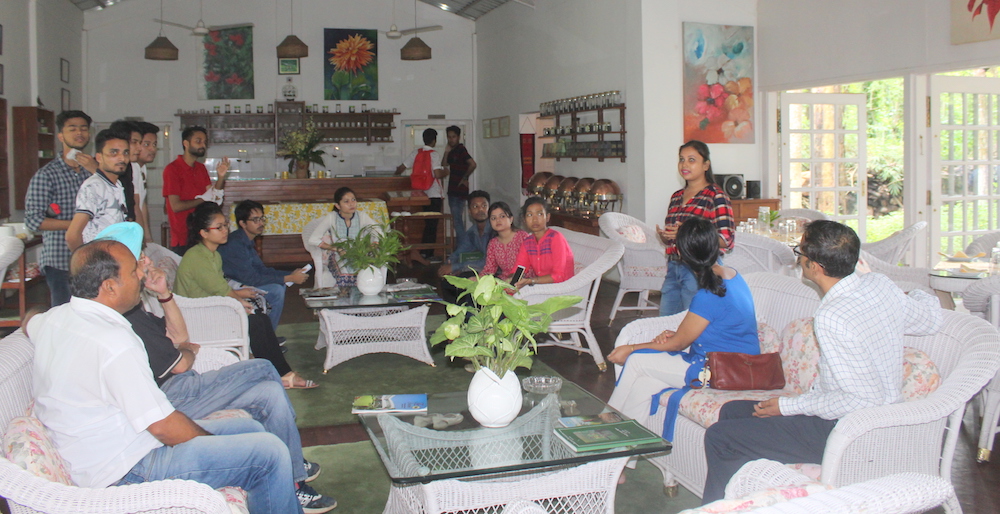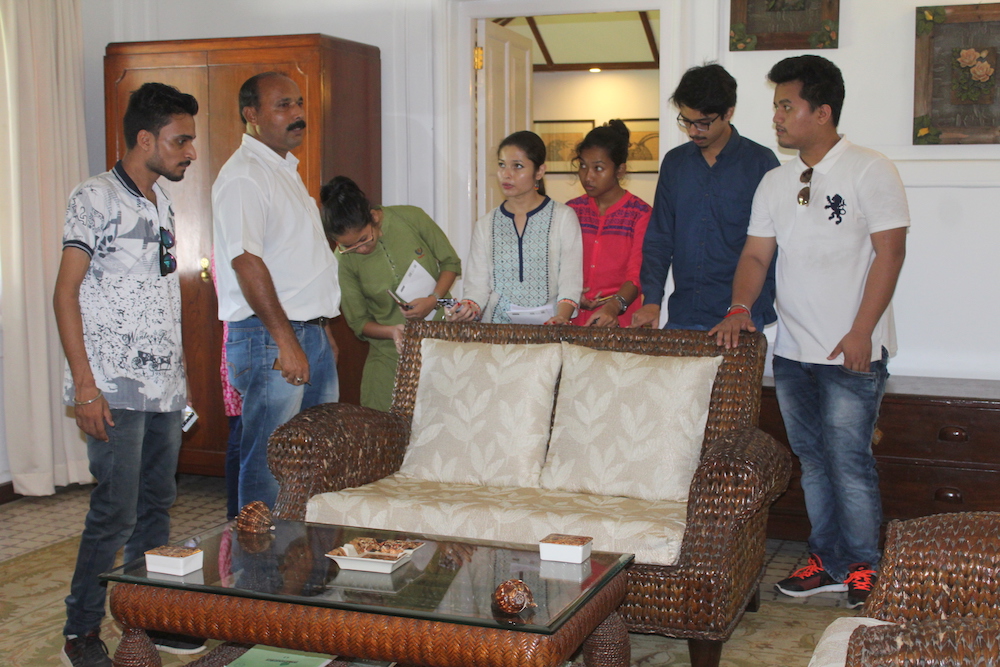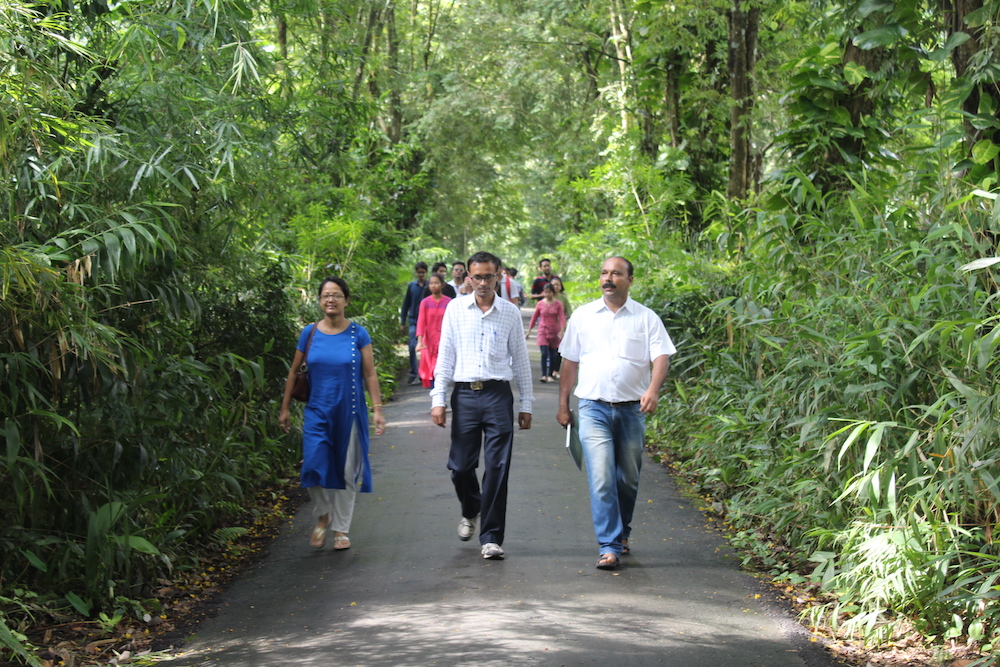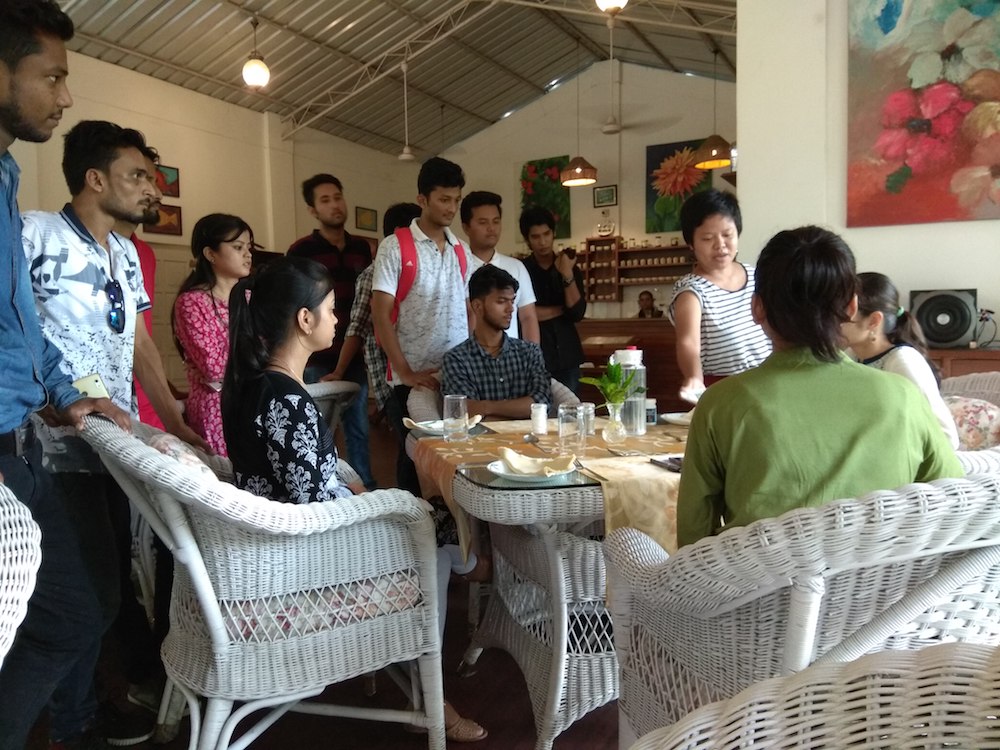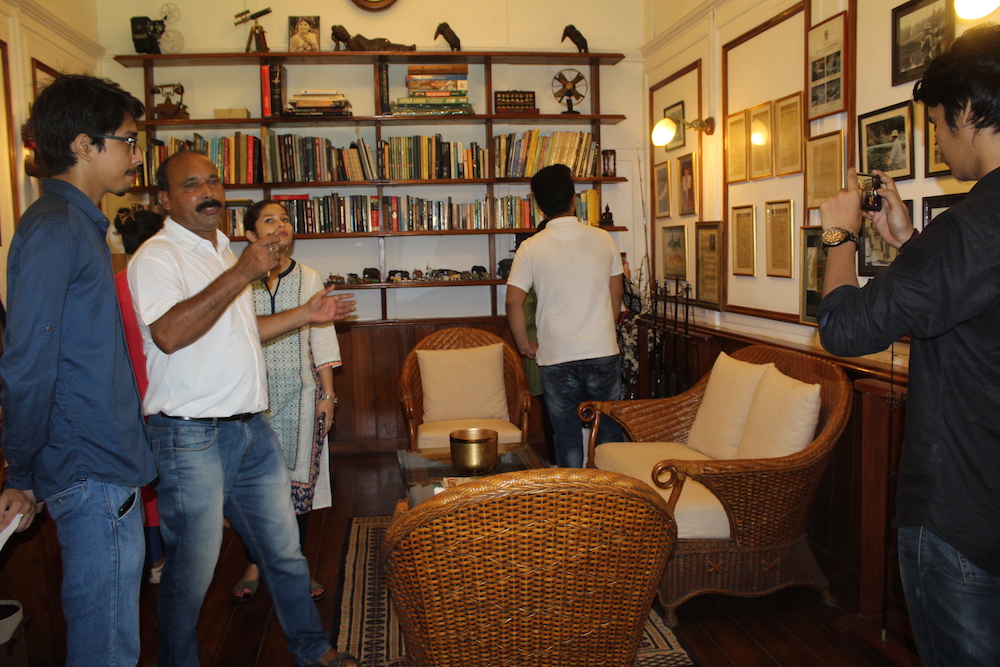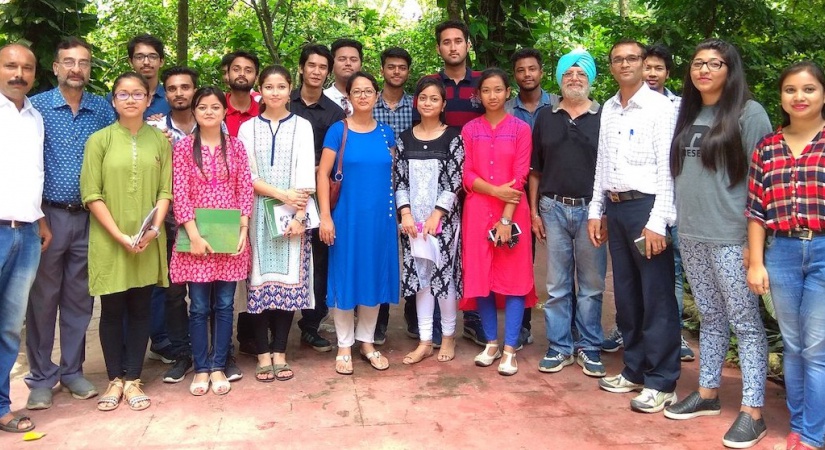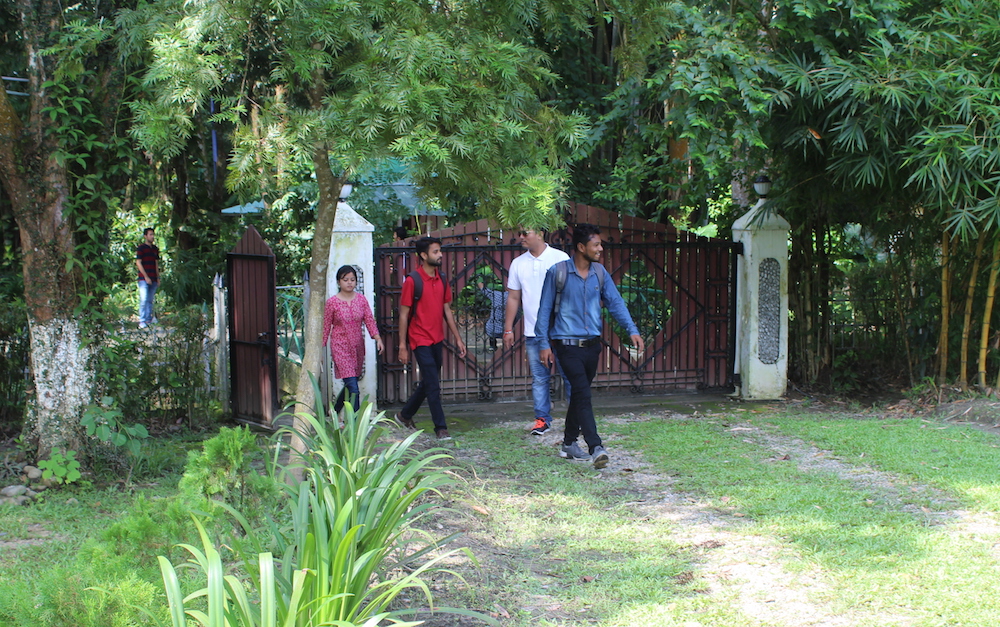Sustainable Tourism Hospitality & Guide Education One Day Naturenomics™ School Programme
Highlights of the event:
> Sustainable Tourism is a critical tool for development in the Eastern Himalayas
> 15 Students studying Tourism and Travel Management from Tezpur University visit the social enterprise of Eastern Himalayan Botanic Ark in residence at Wild Mahseer to learn about strategic framework of sustainable tourism
> Students interact with local communities and assess socio-economic and environmental impacts in the region
Tourism is the 3 rd largest export industry in the world and brings hope, prosperity, and understanding of different cultures, livelihoods and lives all over the world. In 2016, 1.235 million travelers crossed international borders and by 2030 the number is estimated to grow to 1.8 billion. The United Nations Sustainable Development Goals recognizes Tourism as a grand 21 st century human activity, to build a better future for the people, planet, peace and prosperity. – Taleb Rifai, Secretary General, World Tourism Organization.
UNWTO has defined Sustainable Tourism as the "Tourism that takes full account of its current and future economic, social and environmental impacts, addressing the needs of visitors, the industry, the environment and host communities.”
Education and Sustainable Tourism can help make the world a better place to live in by inculcating respect towards culture, nature and communities. With an objective to assess and understand the socio-economic and environment impacts created through Wild Mahseer, students from Tezpur University participated in a one-day programme at the Ark. The social enterprise of Eastern Himalayan Botanic Ark in residence at Wild Mahseer engages 300+ people from local communities to preserve and conserve the bio-cultural heritage of the 22 acres of Addabarie tea Estate providing livelihood opportunity and capacity building.
Students were guided through the history of the property and were given a tour of the Heritage Bungalow, Silver Tips and Second Flush Bungalows giving them an insight on the colonial tea planter’s life. They participated in conversations on the discovery of tea in Assam, life in the tea gardens in 1930s and its legacy. Followed by a tea tasting session where they savored different blends of tea and interacted with the team at Balipara Foundation to understand the concept of Rural Futures, projects and efforts by the Foundation for synergizing community development and conservation.
They were also given an exposure to Homestays as an Alternative Tourism Product for Sustainable Community Development. The essence of sustainable tourism lies not just in the natural landscape of that particular place but also its indigenous communities and local way of life. Community villages in the periphery of the Eastern Himalayan Botanic Ark such as Garo, Mishing and Nyishi are popular destinations for experiencing authentic sociocultural richness and as the communities are at the center of showcasing their bio-cultural heritage and these experiences, they are the primary recipients of tourism benefits.
When traveling to a different country learning something about that place, its culture and its people is vital for a meaningful connection to that place. Educational Tourism through nature walks, cultural and handicrafts workshops, ethnic cooking are useful educational tools for transforming learning experience beyond the traditional learning. Students offered to volunteer to participate in similar programmes by Naturenomics™ School in the future.
The field trip allowed students to develop a better understanding of the multi-fold benefits of sustainable tourism such as economic growth, job creation, social and regional cohesion, protection of natural and cultural heritage and building peaceful relationships. They were given an exposure on the different prospects of tourism in Assam such as ethnic tourism, tea tourism, spiritual tourism, wildlife tourism, adventure tourism and community tourism. As well as the problems associated such as lack of infrastructure, funding, policies and reforms and threats to its natural assets.
Impact of the event:
> Develop an understanding of sustainable tourism and its role in development
> Promotion of Livelihood generation for local communities through sustainable tourism
> Engaging students to volunteer and participate in programmes at the Naturenomics™ School
> Develop an understanding of the challenges faced in tourism industry and their solutions.
> Sustainable Tourism is a critical tool for development in the Eastern Himalayas
> 15 Students studying Tourism and Travel Management from Tezpur University visit the social enterprise of Eastern Himalayan Botanic Ark in residence at Wild Mahseer to learn about strategic framework of sustainable tourism
> Students interact with local communities and assess socio-economic and environmental impacts in the region
Tourism is the 3 rd largest export industry in the world and brings hope, prosperity, and understanding of different cultures, livelihoods and lives all over the world. In 2016, 1.235 million travelers crossed international borders and by 2030 the number is estimated to grow to 1.8 billion. The United Nations Sustainable Development Goals recognizes Tourism as a grand 21 st century human activity, to build a better future for the people, planet, peace and prosperity. – Taleb Rifai, Secretary General, World Tourism Organization.
UNWTO has defined Sustainable Tourism as the "Tourism that takes full account of its current and future economic, social and environmental impacts, addressing the needs of visitors, the industry, the environment and host communities.”
Education and Sustainable Tourism can help make the world a better place to live in by inculcating respect towards culture, nature and communities. With an objective to assess and understand the socio-economic and environment impacts created through Wild Mahseer, students from Tezpur University participated in a one-day programme at the Ark. The social enterprise of Eastern Himalayan Botanic Ark in residence at Wild Mahseer engages 300+ people from local communities to preserve and conserve the bio-cultural heritage of the 22 acres of Addabarie tea Estate providing livelihood opportunity and capacity building.
Students were guided through the history of the property and were given a tour of the Heritage Bungalow, Silver Tips and Second Flush Bungalows giving them an insight on the colonial tea planter’s life. They participated in conversations on the discovery of tea in Assam, life in the tea gardens in 1930s and its legacy. Followed by a tea tasting session where they savored different blends of tea and interacted with the team at Balipara Foundation to understand the concept of Rural Futures, projects and efforts by the Foundation for synergizing community development and conservation.
They were also given an exposure to Homestays as an Alternative Tourism Product for Sustainable Community Development. The essence of sustainable tourism lies not just in the natural landscape of that particular place but also its indigenous communities and local way of life. Community villages in the periphery of the Eastern Himalayan Botanic Ark such as Garo, Mishing and Nyishi are popular destinations for experiencing authentic sociocultural richness and as the communities are at the center of showcasing their bio-cultural heritage and these experiences, they are the primary recipients of tourism benefits.
When traveling to a different country learning something about that place, its culture and its people is vital for a meaningful connection to that place. Educational Tourism through nature walks, cultural and handicrafts workshops, ethnic cooking are useful educational tools for transforming learning experience beyond the traditional learning. Students offered to volunteer to participate in similar programmes by Naturenomics™ School in the future.
The field trip allowed students to develop a better understanding of the multi-fold benefits of sustainable tourism such as economic growth, job creation, social and regional cohesion, protection of natural and cultural heritage and building peaceful relationships. They were given an exposure on the different prospects of tourism in Assam such as ethnic tourism, tea tourism, spiritual tourism, wildlife tourism, adventure tourism and community tourism. As well as the problems associated such as lack of infrastructure, funding, policies and reforms and threats to its natural assets.
Impact of the event:
> Develop an understanding of sustainable tourism and its role in development
> Promotion of Livelihood generation for local communities through sustainable tourism
> Engaging students to volunteer and participate in programmes at the Naturenomics™ School
> Develop an understanding of the challenges faced in tourism industry and their solutions.
